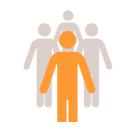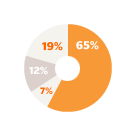FHI 360's Approach to Human Development
The 360° Perspective
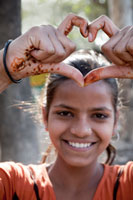
Everything is connected. Health. Education. Nutrition. Environment. Economic Development. Civil Society. Gender Equality. Youth. Research. Technology. The key aspects of our lives are inextricably linked.
Addressing the world's most enduring challenges requires that we examine issues through multiple lenses and make the connections that will improve people's lives. With a 360-degree perspective we are able to work across a broad set of disciplines to deepen our understanding of complex issues. We can deliver thoughtful, evidence-based and tailored responses. We can stimulate innovation. The 360-degree perspective embodies the hope and the promise of redefining the possibilities of human development.
Locally Led, Lasting Change
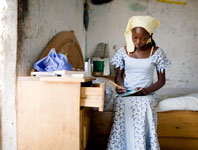
Local partnerships generate change that will last. Change is sustainable when individuals and community groups are engaged from the start.
Empowering individuals, families and communities to tackle their own challenges and take charge of their futures drives all that we do. Through strong partnerships with governments, civil society organizations, the private sector, universities and communities, FHI 360 is helping communities to build the capacity to create jobs, educate children, provide health care, protect natural resources and bring about positive social change.
High Performance, Accountability

Our values guide everything we do. We strive for excellence in every aspect of our work and insist on the highest ethical, quality, operational performance and scientific standards — because we know that enduring change requires nothing less.
To ensure the highest level of accountability to our funders, partners and the people we serve, we continually evaluate and improve our approaches and business processes to anticipate and adapt to evolving needs. To achieve our mission of improving lives, we must develop and deliver high-quality responses that maximize efficiency and exceed expectations.
Experience FHI 360
Click below to read about our projects around the globe.
Girls and young women in sub-Saharan Africa overcome barriers to education
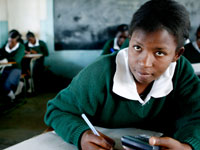
Location: Djibouti and 14 other countries in sub-Saharan Africa
From 2004 through 2011, the Ambassadors' Girls' Scholarship Program (AGSP) addressed key factors preventing girls and boys from completing their education. The seven-year program, implemented by FHI 360 experts, funded over 215,000 scholarships to more than 77,500 girls and boys in 2,800 communities across 15 countries in sub-Saharan Africa, mitigating the economic constraints families face. AGSP also provided HIV/AIDS education to prevent children from dropping out of school due to infection. It encouraged parents and communities to form committees, organizations and associations to create an environment supportive of education and, in particular, girls' education. Program staff trained 1,400 mentors to serve as role models. The program demonstrated the powerful synergy of integrating interventions and leaves a legacy of transformation not only for the girls whose lives it changed, but also for their families and communities.
Funder U.S. Agency for International Development (USAID)
Lives, jobs and lobsters are protected in the Caribbean

Location: Honduras
Overfishing and unsafe fishing practices in the Caribbean endanger the lives and livelihoods of lobster fishers and threaten the environment, local industries and the communities sustained by lobster fishing. The Spiny Lobster Initiative, launched in Honduras in 2009 by FHI 360's Global FISH Alliance (G-FISH), brings together divers, trappers, lobster boat captains, processors, exporters and buyers with environmental groups and officials from the national and local governments to help sustain the spiny lobster and the individuals and communities that depend on it. In 2011, G-FISH supported the development of a new Honduran fisheries law, connected divers to organizations that provide grants and training to transition into new lines of work and trained dive boat captains in safe diving practices. The initiative is improving livelihoods and conserving marine biodiversity at the same time.
Funder Darden Restaurants, Inc. Foundation; USAID
Children and families in India cope better with HIV and AIDS
Location: Andhra Pradesh State, India
In the Andhra Pradesh state in India, where HIV prevalence rates are among the highest in the country, the Balasahyoga (which means "active support to the child") program is improving children's lives by helping to ensure that their parents are healthy, productive and able to provide a stable home. Family case managers connect children and families to clinical care services, nutritional and educational support, social welfare services and income-generating activities. By specifically linking families to relevant resources available within government systems, the program avoids duplication of services, helping to ensure its cost-effectiveness and sustainability. First launched in 2007, Balasahyoga reached more than 73,000 children, 90,000 adults, 48,000 families and nearly 1,100 pregnant women by the end of 2011. The program's comprehensive approach is helping families affected by HIV and AIDS remain strong and resilient while providing children with opportunities to thrive.
Funder The Children's Investment Fund Foundation
Youth participate in shaping Rwanda's development priorities
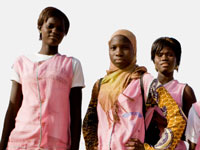
Location: Rwanda
Early in 2011, 45 young researchers canvassed three districts in Rwanda's capital city, Kigali, block by block and mile by mile, to understand better the living conditions, economic situations and employment possibilities for youth as seen by members of the community and youth themselves. Trained as "youth mappers," these local ethnographers completed 2,526 surveys of young people ages 14–24 and 278 business surveys. Over the past seven years, nearly 5,000 young people in urban and rural areas, in school and out, have used a methodology developed by FHI 360 experts called community youth mapping. They surveyed their communities in Chad, Egypt, Haiti, Jordan, Kosovo, the Netherlands, Niger, Rwanda and Sudan, as well as in more than 150 locales across the United States. The surveys addressed a wide range of issues, including education reform, livelihood development and human trafficking. The findings from the most recent survey in Kigali will now be used to ensure that job training programs respond to the needs of the city's young people.
Funder USAID
Timely Education Information Helps to Rebuild Education in South Sudan

Location: South Sudan
Newly independent in July 2011, the Republic of South Sudan had nearly 1.8 million children, scant available resources, and no time to lose in reforming its war-torn education system. Waiting for accurate, comprehensive and timely data about students, teachers and schools was not a feasible option. In a project started in 2006, we worked with the Ministry of General Education and Instruction to develop an education management information system (EMIS) that tracked and reported on 97 percent of all known schools — including remote village schools — and mapped 50 percent of these schools to Google Earth, providing easy access to up-to-date statistics on schools, teachers and students. By the end of 2011, reliable and easily accessible information was available for strategic planning, policymaking, resource allocation and decision making at every administrative level — from the national level to 10 states, 83 counties and 403 villages — data that will support the South Sudanese in building their new nation.
Funder United Nations Children's Fund (UNICEF)
Women have more contraceptive access and choice
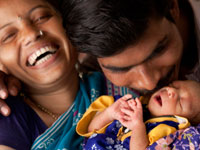
Location: Global
More than 200 million women in developing countries report that they want to avoid a pregnancy but lack access to effective contraceptives. The result: millions of unintended and high-risk pregnancies. With a new grant from the Bill & Melinda Gates Foundation, FHI 360 is supporting the identification and early testing of innovative approaches to longer-acting injectable contraception. Injectable contraceptives appeal to many women because they are effective, do not require daily compliance and can be used discreetly. Yet, currently available injectable contraceptives are effective for only up to three months. In communities where access to health services is limited, longer-acting contraceptives may lead to higher compliance and continuation rates. This project is the first step toward bringing a game-changing injectable contraceptive to market, empowering women and men to determine the size of their families and to improve the quality of life of the children they choose to have.
Funder Bill & Melinda Gates Foundation
Macedonian schools and students get connected

Location: Macedonia
When Macedonia, a small, landlocked country in the Balkans, began its transition from a state-planned economy to an open-market democracy looking to join the European Union, it was understood that education reform was critical to achieving those goals. USAID and the Government of Macedonia (GOM) engaged FHI 360 experts to design an innovative approach to reforming the primary education system. FHI 360 led the Primary Education Project (PEP) by convening several GOM Ministries, harnessing technical capacity and tapping into human and financial resources. By the end of 2011, over 17,000 teachers were trained and over 200,000 primary and secondary school students could connect to the world via the Internet. Nearly 300,000 manuals and guidebooks were produced in three languages. One hundred and thirty schools had been renovated. In the process, Macedonia expanded opportunities for its students and its citizens, paving the way for a brighter future.
Funder USAID
Health services in sub-Saharan Africa screen for noncommunicable diseases
Location: Ghana, Kenya, Nigeria, Zambia
According to the World Health Organization, without immediate intervention, noncommunicable diseases will cause more deaths by 2030 in low- and middle-income countries than AIDS, tuberculosis, malaria, childbirth and nutritional disorders combined. Using lessons learned from previous FHI 360 pilot studies, screenings for cardiovascular disease and cervical cancer are provided at all HIV treatment sites in Nigeria. Noncommunicable disease integration services are also in place in Kenya and Zambia. In Ghana, a project launched in August 2011 screens approximately 400 clients per week for cardiovascular disease risk factors in two outpatient clinics. To extend the reach of services, community outreach events are held and clients are sent text messages on healthy living and treatment reminders. Through its community-based research and programs, FHI 360 is connecting people and health systems to address better the burden of noncommunicable diseases.
Funder FHI 360, USAID
Mobile phones are used to revolutionize reproductive health

Location: Kenya and Tanzania
In many countries, women lack ready access to lifesaving information. FHI 360 has been at the forefront of using mobile phones to reach women directly with health information that saves lives. FHI 360's m4RH (Mobile for Reproductive Health) project has reached more than 13,000 users in Kenya and Tanzania with text messaging about family planning, contraceptive options and where to find family planning clinics in their communities. The messages, based on World Health Organization and country-specific guidelines, were designed and tested to ensure user comprehension, and the technology was evaluated and refined through usability testing. As of mid-December 2011, m4RH had 50,297 hits and counting. By providing essential health information, m4RH is helping women make better-informed decisions for themselves and their families.
Funder USAID
Health care access expands in underserved U.S. communities

Location: Santa Fe, New Mexico and 14,000 other health care sites across the U.S.
The U.S. Health Resources and Services Administration engaged FHI 360 experts from 2009 to 2011 to rebrand and promote its National Health Service Corps (NHSC), a federal program that places primary care clinicians in underserved U.S. urban and rural communities. The goal was to raise the profile of the NHSC and recruit additional members, thereby bringing health care to those who need it most. Using an evidence-based approach, we redesigned the website (http://nhsc.hrsa.gov), logo and all program materials, and more prominently featured NHSC members — doctors, nurses, dentists and physician assistants — and their reasons for participating in the program. We also conducted targeted outreach to prospective applicants through social media, paid search and online advertising. One month after the two-year project ended in October 2011, NHSC membership was reported to exceed 10,000, a 150 percent increase from when we began.
Funder U.S. Health Resources and Services Administration
Schools address gender-based violence in the Democratic Republic of the Congo
Location: Katanga Province, Democratic Republic of the Congo
In 31 primary and secondary schools and neighboring communities in Katanga Province, the C-Change project is equipping girls and boys ages 10–14 to resist and report school-related, gender-based violence and is providing support when it occurs. The project has trained more than 200 teachers and established codes of conduct, classroom regulations and procedures for both preventing and addressing such violence. The project's community radio and strategic use of media encourage parents and other community members to support change both inside and outside the classroom: 861 radio spots were aired and six in-depth radio shows were broadcast 17 times from September through December 2011. Publications, school curricula, referral guides and a comic book series have been produced and distributed. Additionally, 154 youth club leaders have been trained as peer mentors. The project's comprehensive approach is changing attitudes and beliefs, while helping to guarantee a safe and secure learning environment.
Funder USAID
The Internet strengthens democracy in Peru
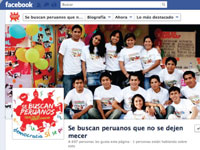
Location: Peru
Voting in elections in Peru is mandatory, yet informed voting has historically been low because voters typically found it difficult to access electoral information. In 2011, however, nearly 52,000 Peruvians at home and abroad followed their country's electoral news for the first time through social networking sites established by the government's electoral bodies. On April 10, the day before the national and presidential elections, 1,700 questions were asked and answered via Facebook and Twitter. The Democracia Activa Peru program made this possible by using the Internet to mobilize citizens and promote networking. Citizen fairs, a virtual community and youth leader workshops were vital in the campaign. The USAID-funded program, implemented by FHI 360, was especially focused on women and young people ages 18–35. It supported the Peruvian government's commitment to increase its citizens' trust and participation in the country's democratic process.
Funder USAID
Project improves nutrition and food security
Location: Uganda and in 18 other countries across Africa, Asia, and Latin America and the Caribbean
Through the Food and Nutrition Technical Assistance II Project (FANTA-2), FHI 360 built on more than a decade of experience in improving and expanding global standards and capacity for nutrition and food security. We strengthened the capacity of ministries, nongovernmental organizations and USAID-funded projects to support and implement proven nutrition-related programs by training more than 2,000 community- and facility-based health practitioners, volunteers, academicians and technical staff. We created tools that enabled better detection and management of acute malnutrition and that improved the targeting, implementation, monitoring and evaluation of food security interventions. We also helped 16 host country governments develop national nutrition policies, action plans and guidelines. Through these efforts, we have contributed to sustainable improvements in the nutritional status of vulnerable populations, including women and children, and to increased national productivity and economic growth.
Funder USAID
Women in Moldova build sustainable livelihoods
Location: Moldova
In Moldova, Pro-Business Nord (PBN) provides business skills, sustainable livelihood training and job placement at no cost to women who lack professional opportunities due to poverty, limited education and gender-based stereotypes. Two years ago, PBN turned to FHI 360's Capable Partners Program (CAP) for technical assistance to build and enhance the systems and processes necessary for serving its own beneficiaries and, in turn, bolstering the performance of the nongovernmental organizations and small businesses it also advises and assists. CAP collaborated with PBN to identify challenges and opportunities using its Institutional Development Framework, a capacity-assessment process and tool that has proven effective in over 50 countries. PBN launched a distance-learning web portal and is now engaging community leaders in program planning. By the end of 2011, PBN had improved its operations, financial management and fundraising capacity, enabling it to become more efficient and have greater impact on the communities it serves.
Funder USAID
Sex workers lead HIV prevention in India
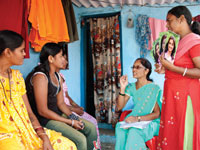
Location: Maharashtra State, India
From its inception, the Aastha project has enlisted the participation of its beneficiaries to accomplish its goal of reducing the incidence of HIV and other sexually transmitted infections among sex workers in the Indian state of Maharashtra. During the six-year life of the project, more than 2,600 sex workers have been trained and mentored to become leaders of self-help groups. The groups have played a vital role in improving healthy behaviors among their peers and increasing use of community services. Aastha has reached more than 80,000 sex workers in Mumbai with comprehensive HIV prevention and care services. In 2011 alone, the project reached more than 27,500 individuals, who received more than 83,500 consultations for screening of sexually transmitted infections. And, it provided voluntary counseling and testing for nearly 17,000 individuals while also facilitating school admission for 121 of their children.
Funder Bill & Melinda Gates Foundation
Transport corridor communities in Africa mobilize against HIV
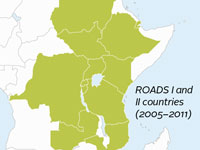
Location: 11 African countries (ROADS I and II)
The transport corridors of east, central and southern Africa are economic lifelines that link countries with their neighbors. They are also major transmission routes for HIV. The Roads to a Healthy Future (ROADS II) project is strengthening communities along these routes by linking them with health services, expanding economic opportunities, improving food security and working to protect women and girls from sexual exploitation and abuse. ROADS II brings together local volunteer groups with similar interests to plan and implement activities jointly to meet community needs — from generating demand for HIV testing and counseling to enhancing food security and livelihoods for women. ROADS II collaborates closely with national AIDS control programs; government ministries; district health management teams; health facilities; and local, national and multinational companies. By the end of 2011, ROADS I and II had reached approximately 4.3 million people, including 300,000 truck drivers across 11 African countries. About 1,200 community-based organizations with more than 82,000 members had been mobilized into 80 community clusters, transforming corridors of risk into pathways of prevention and hope.
Funder U.S. President's Emergency Plan for AIDS Relief (PEPFAR), USAID
Financial sector capacity is strengthened in the West Bank and Gaza
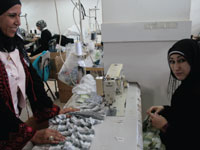
Location: West Bank and Gaza
Under the Expanded and Sustained Access to Financial Services (ESAF) program, FHI 360 is building a more inclusive financial sector for Palestinian households and businesses. FHI 360 has partnered with regulators, industry associations, educational institutions and the private sector to promote financial literacy and improve access to savings, credit and insurance. We assisted the Palestinian Monetary Authority to establish a consumer protection department, cited by the International Monetary Fund as one of the agency's most significant recent reforms. We also led a national media campaign that improved public knowledge about and confidence in the financial sector, during which the number of people aware of the Palestinian Capital Markets Authority, a key regulatory body, nearly tripled to 680,000. Through a US$8 million grant fund, FHI 360 improved the productivity of 38 small and medium enterprises, stimulating US$16 million in private investment and creating 698 jobs.
Funder USAID
Students in North Dakota, U.S., prepare for success

Location: North Dakota, U.S.
Together with Hess Corporation and a steering committee of state leaders, we are collaborating on Succeed 2020, a bold initiative aimed at helping North Dakota students become better prepared for college and 21st century careers. North Dakota's eight regional education associations (REAs) are leading the project, bringing together school districts and higher education institutions, state and local government, businesses, Native American groups and community-based organizations. FHI 360 staff members are working closely with the REAs and their partners on strategies related to rigorous coursework, ongoing college and career planning, targeted supports (which might include tutoring, specialized counseling or work-based learning opportunities) and use of data. Key indicators of success will include higher college entrance exam scores, higher rates of on-time secondary and postsecondary completion, and reduced need for remedial courses at the postsecondary level. Special emphasis is being placed on closing the achievement gap between Native American students and others in the state.
Funder Hess Corporation
A breakthrough in HIV prevention
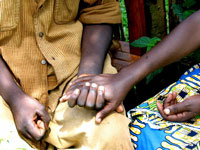
Location: 13 sites across Africa, Asia and the Americas
In 2011, Science named the HIV Prevention Trials Network (HPTN) 052 study "Breakthrough of the Year." This was the second year in a row that Science selected a trial for which FHI 360 provided scientific leadership and operational support. HPTN 052 was the first randomized clinical trial to show that providing early antiretroviral therapy to an HIV-infected person can dramatically lower the risk of sexual transmission of HIV to an uninfected partner — reducing the risk of infection by as much as 96 percent. According to Science, one of the premier scientific research journals, the study was selected for its "profound implications for the future response to the AIDS epidemic."
Funder National Institute of Allergy and Infectious Diseases, U.S. National Institutes of Health
Safeguards protect study participants
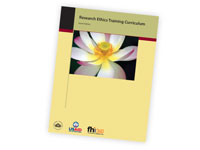
Location: Global
Protecting human participants in all the research we conduct is paramount in our commitment to the people we serve. FHI 360's Protection of Human Subjects Committee reviews research proposals, procedures and informed consent documents to assure that safeguards are in place to protect human participants and that the process is equitable and free of coercion. Our award-winning Research Ethics Training Curriculum is widely used by the global research community, including academics, nongovernmental organizations and community leaders. From August 2010 to August 2011, FHI 360 conducted clinical trials and behavioral research in over 25 countries around the globe, all of which were held to the universal ethics principles of respect, beneficence and justice for all study participants.
Quality and competence in laboratory services

Location: Africa, Asia, and Latin America
Poor quality of laboratory services and inaccurate results can lead to inappropriate action, inaction or incorrect diagnosis and treatment. In 2011, FHI 360 assisted six government hospital laboratories in earning International Organization for Standardization (ISO) 15189 accreditation for quality and competence in medical laboratories. Through a program managed by FHI 360, the first public laboratories in Bangladesh and Indonesia, as well as an additional four laboratories in Vietnam, now meet these standards. With these accreditations, the laboratories are ensuring accurate results when testing for diseases, producing timely results, respecting ethics and protecting the safety of patients and clinical staff alike. In addition, we trained more than 750 medical and laboratory technologists in Africa, Asia and Latin America on topics including ISO 15189, infection control, malaria microscopy, quality management systems and objective measurement.
Funder International Centre for Diarrhoeal Disease Research, Bangladesh (icddr,b); U.S Centers for Disease Control and Prevention; U.S. National Institutes of Health
Design that inspires and delights

Location: Washington DC, U.S.
How do you get U.S. farmers to modify their tractors to prevent injury in the event of tractor rollover? Use the power of design. At the end of 2011, FHI 360's Design Lab was honored by AIGA (American Institute of Graphic Arts) in its AIGA 50 competition, which recognized the strongest examples of design in the District of Columbia region. The award was given for a series of posters on Rollover Protective Structures, part of a campaign to get farmers in New Hampshire, New York, Pennsylvania and Vermont to retrofit their tractors and reduce the risk of injury and death from tractor rollover. The posters were exhibited at the Corcoran Gallery in Washington, DC. Design Lab 360, a full-service design studio within FHI 360, uses design in thoughtful and meaningful ways to advance human development and inspire change.
Asthma guidelines are put into practice
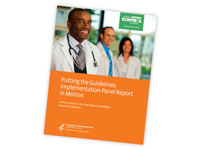
Location: U.S.
Effective public health outreach starts with clear communication. In May 2011, the Plain Language Awards given by the U.S. National Institutes of Health honored FHI 360 experts for the publication, National Asthma Control Initiative: Keeping Airways Open — Putting the Guidelines Implementation Panel Report in Motion. The bulletin highlights specific actions that organizations from local, state, regional and national levels can take to put national guidelines for diagnosing and managing asthma into practice.
Funder National Heart, Lung and Blood Institute, U.S. National Institutes of Health
Safety and efficacy come first while testing more than 1 billion products
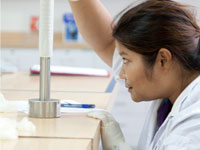
Location: Bangkok, Thailand and North Carolina, U.S.
A single defective condom or counterfeit medication can endanger lives. Our Product Quality and Compliance laboratories in Thailand and the United States ensure that contraceptives, pharmaceuticals and medical devices and supplies are safe and effective and comply with international standards. Our chemical analysis of drugs can detect counterfeit medications, an increasing threat in the global marketplace, and our state-of-the-art equipment has enabled us to assure high-efficiency quality testing of male and female condoms. In 2011, we tested product batches1 representing more than:
- 1.2 billion male and female condoms
- 10.5 million malaria drug treatments
- 10.4 million polyester and polyethylene bed nets
- 1.6 million intrauterine devices (IUDs)
- 2.5 million cycles of oral contraceptives
- 3 million vials of injectable contraceptives
- 75,000 contraceptive implants
- 2.1 million zinc sulfate tablets
1 Does not include all products tested in 2011.
Programs and research promote gender equality
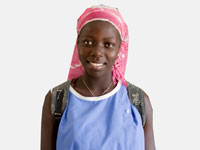
Location: sub-Saharan Africa
Our decades of research and experience on issues that affect women's status — including girls' education, reproductive health and economic development — have provided clear evidence on how we can enhance the impact of our work: by challenging gender-based inequalities that pose barriers to development progress. In 2011, we introduced FHI 360's Gender Integration Framework, a crosscutting approach to promote significant and sustainable gains for women and men, girls and boys, and sexual and gender minorities. The framework contains guidance on how to conduct a gender analysis — a systematic way of examining the gender norms and inequalities that are likely to affect the achievement of sustainable results. It then explains how to use those findings to integrate a gender perspective throughout our research and programs. The first regional workshop was conducted in September 2011 in Africa to build capacity among FHI 360 staff to put the framework into practice.
A new approach strengthens the technical quality of our programs
Location: Ethiopia and Nepal
In 2011, we began developing a new standardized approach to evaluate and strengthen the technical quality of our country programs. This approach and accompanying tools address essential dimensions of technical quality, including program design, implementation, monitoring and evaluation. Assessments piloted in 2011 with our Ethiopia and Nepal Country Offices revealed the power of this approach to identify promising program practices and innovations and prioritize programmatic needs for technical leadership. Lessons learned from these assessments are used to inform how we support our programs worldwide and ensure that we achieve consistently high standards.
Personal responsibility is emphasized at all levels
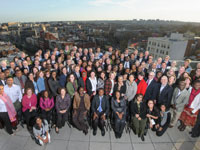
Location: Global
FHI 360's Office of Compliance and Internal Audit (OCIA) is led by the Chief Compliance Officer, who reports to the Audit Committee of the Board of Directors. OCIA promotes a worldwide culture of compliance through field-based first responders (regional compliance officers). Its primary activities fall under three categories: compliance, audit and enterprise risk management. The division conducts independent audits, reviews and investigations, and provides ongoing training and consultation that emphasize personal responsibility at all levels. In 2011, internal audits were conducted on the vast majority of our global revenue and countries where we work. As part of an enterprise risk management function, OCIA is working with senior leadership to refine the risk framework and design an actionable results-oriented system. The purpose of the system is to facilitate senior level decision making with consideration to risks associated with our work. Focusing on the proactive and preventive, OCIA has developed compliance-related training on topics such as conflict of interest, bribery and the Foreign Corrupt Practices Act. It has established an independent anonymous hotline, a whistle-blower website and an internal portal where FHI 360 staff can access a range of tools and resources, such as OCIA review questionnaires, articles related to audit and compliance issues, investigation methodology and quarterly newsletters.
Male circumcision technique saves lives
Location: Kenya, Uganda and Zambia
Scale-up of voluntary medical male circumcision could prevent 3.4 million HIV infections in Africa by 2025 and save an estimated US$16.5 billion in HIV treatment costs. In collaboration with EngenderHealth and the Urology Department of Weill Cornell Medical College, FHI 360 is assessing the Shang Ring. The Shang Ring is a disposable circumcision device that is usually removed at seven days but detaches spontaneously in about two weeks if a man does not return for follow-up. The procedure is minimally invasive, with no sutures and no or negligible bleeding. A randomized trial, completed by FHI 360 and its partners in Kenya and Zambia in 2011, found that use of the Shang Ring is highly acceptable to men in Africa and, compared with conventional surgery, offers a faster, more cost-effective way to perform male circumcisions and provides better cosmetic results. A larger field study is in progress, with plans to submit the results to a panel of international experts convened by the World Health Organization. In Uganda, the FHI 360 team provided training to researchers in Rakai who are independently conducting research on the Shang Ring. Broad adoption of the Shang Ring could potentially save millions of lives.
Funder Bill & Melinda Gates Foundation (Kenya and Zambia), U.S. National Institutes of Health (Uganda)



